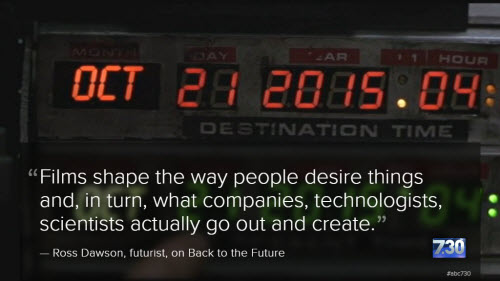As other futurists, I’ve had done quite a few media interviews recently on Back to the Future 2, which was set on October 21, 2015.
One of the most interesting broader issues around the film is very simply the degree of interest people have in the film, which captured people’s imaginations about the future, even though it was primarily a comedy.
ABC’s 7:30 Report on Wednesday ran a segment on Back to the Future 2 and tweeted this quote from me:

In a syndicated piece by AFP on Back to the Future and in an earlier article in Newsweek I made the same point:
The reason people have been trying to create a hoverboard is that it was in the film and it captured people’s imaginations. They weren’t trying to predict the future, they were trying to create an interesting film, but I think it’s interesting that everyone is saying “Where is my hoverboard” and now people are trying to create that. We discover what we want. Science fiction creates the desire for the technology that we see, which means that entrepreneurs can see if there is a desire and they then work hard to be able to create the technologies that we’ve discovered that we want.
Countless technology innovators have said how they were inspired by William Gibson’s Neuromancer and Neal Stephenson’s Snow Crash to create essential elements of the connected world we know today.
Science fiction in movies and books has shaped what we desire, as well as what we fear. It is a critical driving force in helping us shape our future, as it uncovers what we want to happen and don’t want to happen. Let us celebrate all science fiction, from the most serious to light-hearted comedy.








 I was recently interviewed for an extended feature on the future of travel,
I was recently interviewed for an extended feature on the future of travel, 
